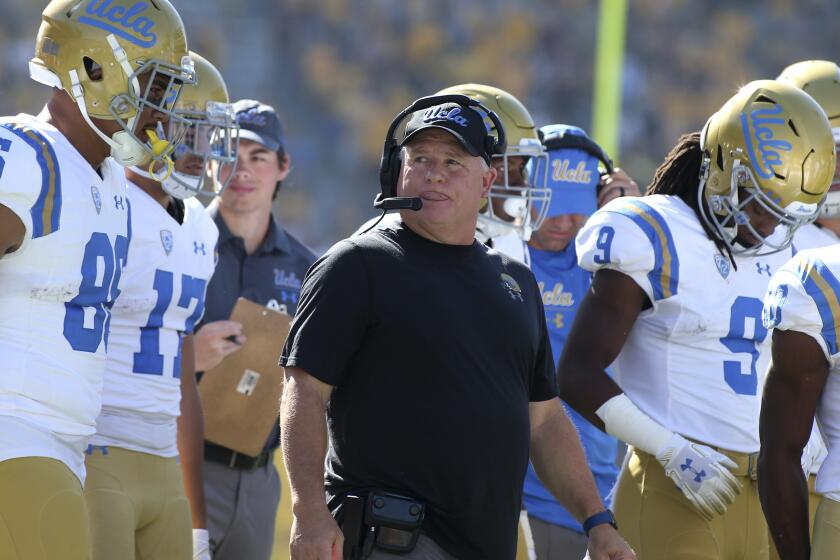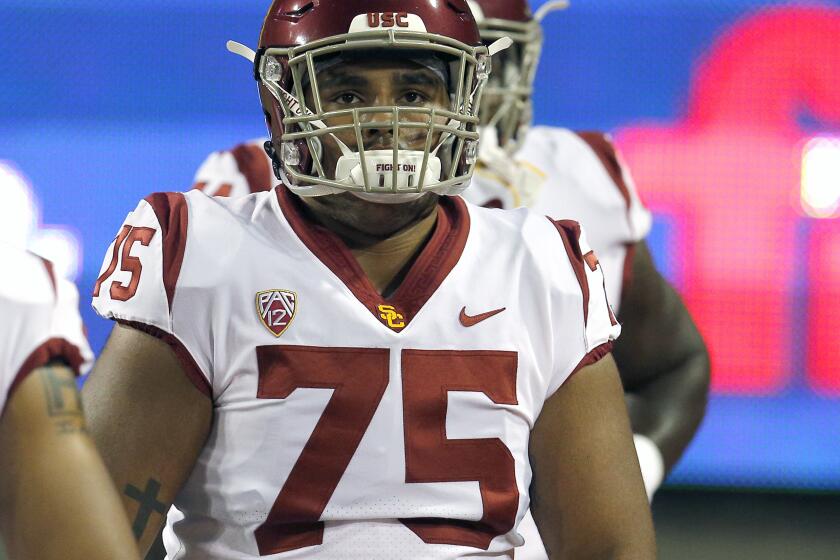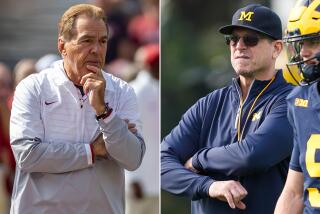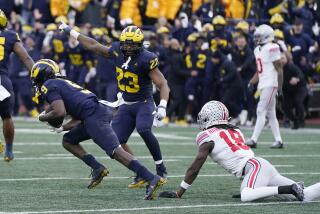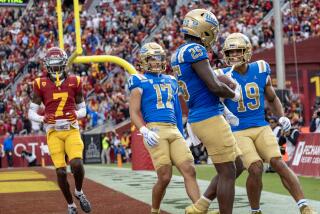Commentary: As college football starts, focusing on just the games will be nearly impossible
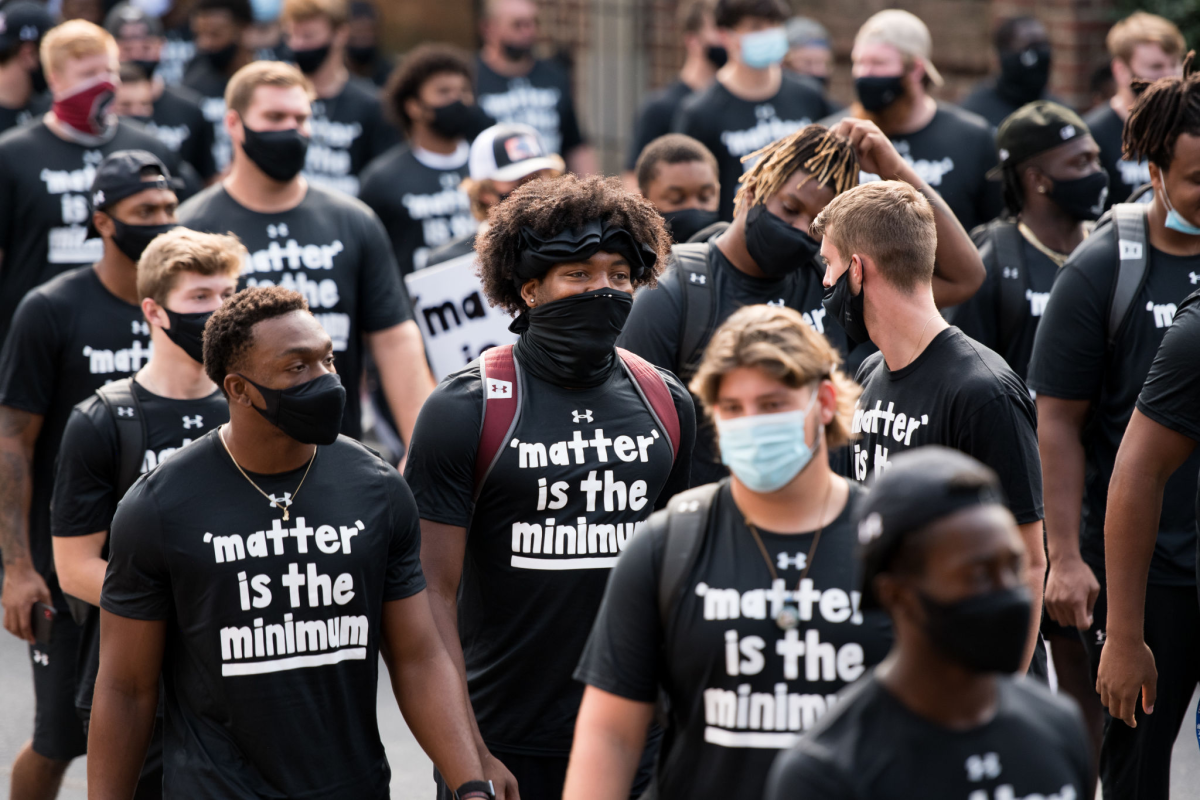
- Share via
In a parallel universe, USC-Alabama and Michigan-Washington already would have played. Then Ohio State-Oregon and Texas-Louisiana State would tangle Saturday, two titanic matchups tussling for prime-time attention.
Instead, on the first Saturday of Power Five college football in 2020, we’ve got Iowa State and Louisiana-Lafayette as arguably the game of the day, even though ESPN College GameDay will broadcast from Wake Forest, where the Demon Deacons welcome No. 1 Clemson, a near-five-touchdown favorite.
In Ames, Iowa, where campus bars remain open despite one of the nation’s largest COVID-19 surges in recent weeks, Iowa State announced a week ago it still would try to pack 25,000 fans into Jack Trice Stadium at 40% capacity. After an intense public flogging, the school fully reversed course, saying it would allow no fans at Saturday’s game against the Rajin’ Cajuns.
In Winston-Salem, N.C., there won’t be fans in the stands either, but Kirk Herbstreit will be in the booth, nearly six months after he became the first prominent voice to publicly doubt whether there would be a football season. Herbstreit was only about half-right. The Big Ten and Pac-12 have decided to sit this one out, but how could Herbstreit have known back in March the question of whether to allow “amateur” athletes to play a contact sport during a pandemic would become so political?
UCLA’s Bruin Support Program has generated more than $1.2 million in only a few weeks to help cover costs associated with the COVID-19 pandemic.
No matter how much of this season is completed, no matter how much TV money is recouped by the schools, no matter the cost to the lives of the players, coaches, staff and fans who participate — or to the reputations of conference and school officials — we know this will be a season unlike any other. And it will be remembered not for the games on the field but for the ones that were played off it.
You can try to compartmentalize and pretend like it’s 2019 and view Clemson quarterback Trevor Lawrence strictly as the best player in the country and the assumed No. 1 pick in next year’s NFL draft, but that won’t be easy to pull off. During the pandemic, and in the aftermath of the killing of George Floyd, Lawrence has used his platform to push against racial injustice. On Sunday, he tweeted a statement from “CFB Players” with five “actionable steps” to create “real change.”
“As we return to our respective campuses and most of us suit up in pads for the 2020 college football season, we realize the power we have to enact this change,” the statement said. “We, the players, have a voice, and we will use it to drive out injustice, improve our communities and inspire the future generations.”
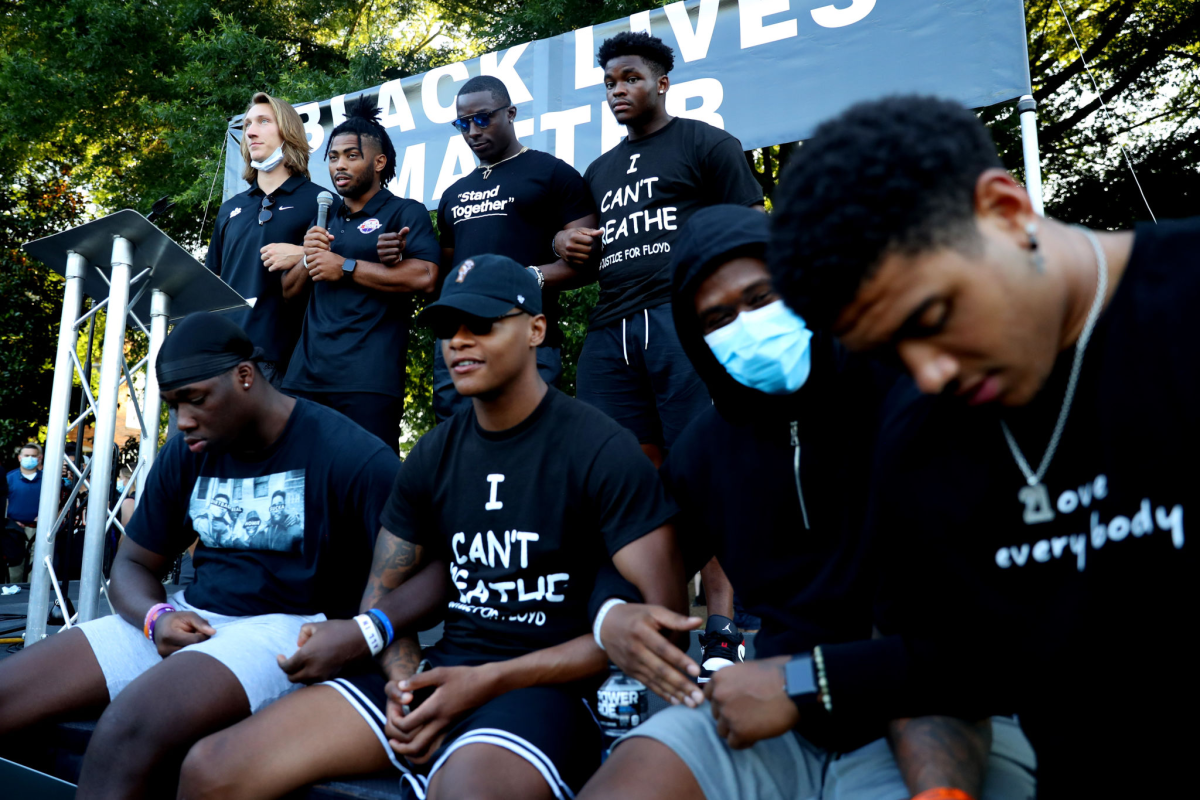
In the Pac-12 and Big Ten, players organized this summer to make demands of their conferences, which at the time were asking them to return to campus and prepare to play a season that would put their health and safety at risk. Those leagues — unlike the Atlantic Coast Conference, Big 12 Conference and Southeastern Conference — chose to err on the side of caution and avoid years in court fighting liability lawsuits.
The three Power Five leagues who are playing are stocked with young men who want to compete in the sport they love, but also appear devoted to not letting the player empowerment movement get lost in a national championship chase that won’t include nine of the Associated Press preseason top 25 teams.
Herbstreit, as it turns out, is the perfect guy to call this season with all this in mind. During last Saturday’s College Gameday, Herbstreit discussed the intersection of racial injustice and college football and found himself in tears.
“The Black community is hurting. If you’ve listened. How do you listen to these stories and not feel pain and not want to help?” Herbstreit said. “Wearing a hoodie. Putting your hands at 10 and 2. ‘Oh, God, I’d better watch out because I’m wearing Nike gear.’ Like, what? What are we talking about? You can’t relate to that if you’re white, but you can listen and you can try to help. Because this is not OK. It’s just not.
“We’ve got to do better, man. We’ve got to, like, lock arm-in-arm and be together.”
USC offensive lineman Alijah Vera-Tucker announced on Wednesday that he will opt out of the upcoming Pac-12 season to train for the 2021 draft.
Herbstreit won’t be afraid to look at Lawrence’s impact on this season beyond being a top quarterback who has played in two national championship games in as many years. And Wake Forest, which has never hosted College Gameday before and has seen few big-time broadcast slots, will be wearing helmets that say “Black Lives Matter.”
Sure, the game offerings will improve as the weeks go by. The SEC gets started on Sept. 26, and before long, we’ll have No. 3 Alabama-No. 4 Georgia, No. 6 Louisiana State-No. 8 Florida and Clemson-No. 10 Notre Dame, plus traditional rivalries such as No. 5 Oklahoma-No. 14 Texas and the Iron Bowl (Alabama-Auburn). That will be fun, and a College Football Playoff comprised of Clemson plus two (maybe three?) SEC schools would be high drama.
Heartbroken Pac-12 and Big Ten fans probably will learn something about their college football devotion this fall. With USC and UCLA having no stake in the national conversation, why tune in for Mississippi-LSU or Notre Dame-North Carolina? Those who watch each week will prove themselves to be among the sport’s true diehards.
From a cultural standpoint, it will be fascinating to follow what happens. In Baton Rouge, La., where the positivity rate for coronavirus tests is about 6%, LSU is planning to allow 25,000 fans in Tiger Stadium while outlawing tailgating on campus. Telling LSU fans to come to the game but not tailgate shows how disconnected university administrators have become from reality.
In Chapel Hill, N.C., after a major outbreak of cases upon students’ return to campus, North Carolina decided to go online-only. Yet, football “student-athletes” remain.
It’s OK for this season to be different. Politics and the greater societal dynamics will be a part of the show, and better to set those expectations now. College football represents America — always has, always will. Today, this is us.
More to Read
Go beyond the scoreboard
Get the latest on L.A.'s teams in the daily Sports Report newsletter.
You may occasionally receive promotional content from the Los Angeles Times.

